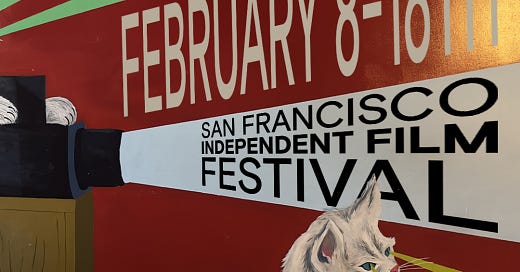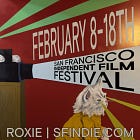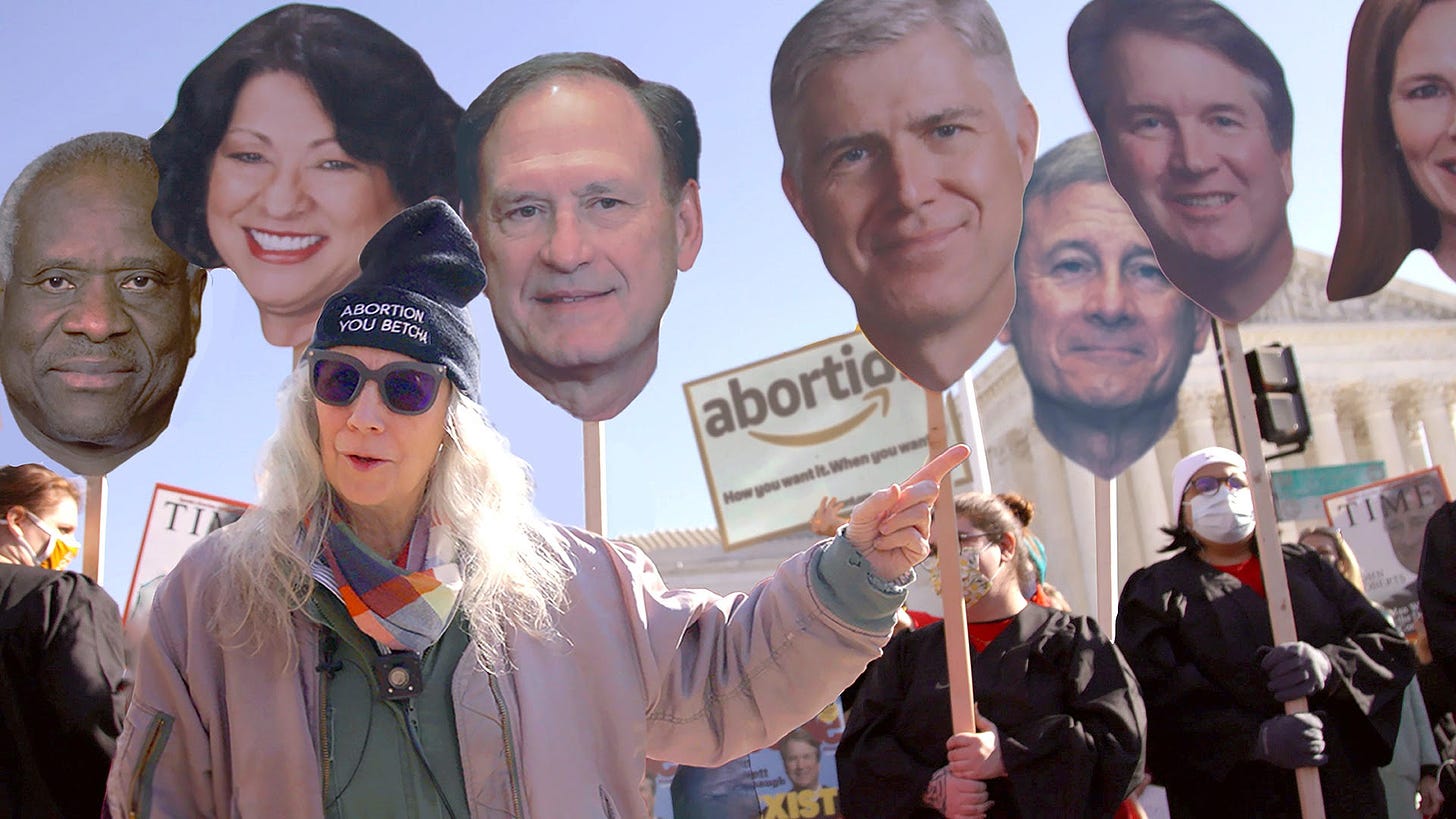Special Coverage: SF Independent Film Festival 2024, Feature Selections
A collection of feature film reviews from a great indie film event.
Dear Moviegoers,
Occasionally, I’ll review films from beyond the bayous of Louisiana and the Gulf South.
Well, more than occasionally. Often.
This time, I’ve been invited to give some thoughts on some of the films from this year’s SF (San Francisco) Independent Film Festival, running virtually and in-person from February 8th to 18th.
I chose four feature films out of a grand slate of diverse cinema (streaming online/virtually until the 18th). For more information and to buy tickets, visit sfindie.com. Hurry before the event ends.
Enjoy:
Are lecture video production companies a thing? In a competitive content creation marketplace, it probably is. Sorry, We’re Dead shows such a business as a place of limbo for ex and present film students, where talent and wannabe skills are used to cover the silliness of misfit professors, speaking before bored audiences, doing mic drops in far too expected sequence. This is the busy life of one Lana Jing, who desperately tries to finish a long-labored screenplay.
Played with Daria-like conviction by Sarah Lee, Lana’s interactions with other people - the kind that annoys her constantly and without end - are filled with aggressive exhaustion, extreme sarcasm, and fourth-wall-breaking moments of film school lessons.
Sorry, We’re Dead, in its meta interests in filmmaking aesthetic and its great appreciation for cinema in general, reminds me of the difficult-to-find late 90s/early 2000s movie Enchanted and the Woody Allen-obsessed Burning Annie, both of which involve college students trying to navigate their potential futures.
What starts as frustrating and grating quickly turns to charming and engaging, as the cringeworthy dialogue and inside jokes soon enough make sense and blend well into the overall narrative and the ultimate enjoyment of the story. Sorry, We’re Dead rises above a challenging premise just barely but successfully, and with a fine passion to boot.
An accomplished feat off the shrugging shoulders of Sarah Lee and the confidence of the film’s directed Alex Zajicek, this combination of vision and performance wouldn’t have been able to overcome its clunkiness without the two. And for a cute indie flick, how unfortunate that would be. 3/5
If one thing is made clear in the documentary No One Asked You, it’s that Lizz Winstead, comedian and creator of The Daily Show, is a brilliant, brave, and damn determined woman. Her activism and volunteering with multiple health care and abortion providers and pro organizations isn’t meant to put people to shame - far from it - but to inspiration towards individual and collective action.
If one thing is made clearer by the film, it’s that abortion should not be a scary or taboo word. Through the “Vagical Mystery Tour,” her group of colleagues and comedians would go from town to town, usually, ones strategic and important to the movement of protecting Roe v Wade and strengthening services, countering anti-abortion/so-called pro-life protesters with confrontational jokes and pointed arguments. To witness such in your face and incredibly proud moments makes me blush.
No One Asked You takes place in the few years before, during, and after the gutting of Roe v Wade by the Supreme Court of the United States, and the closing of The Pinnk House, a vastly important clinic in Mississippi. Holding court with regular women who’ve needed abortions in the past, some of whom had back alley horror stories, make for eye-opening shock and tearful awe. But, make no mistake about it, No One Asked You isn’t about sadness, but about the power of everyday women, men, and trans individuals to push forward and never stop.
This film isn’t just another entry in the progressive politics genre of documentary filmmaking. It’s truly special - a road trip of grand proportion. 4/5
I never would’ve expected to find a kindred spirit of Eraserhead and Pi in a modern-day life in the Big City film, even if it involves expected existential dread. Shot on an iPhone, mostly in gorgeously composed black & white cinematography, In the Meantime makes for what could be an early favorite film of 2024 for me. It’s nowhere near a Frances Ha companion piece as it’s marketed as, but instead a domestic horror of time lapses and panic attacks.
Taking place over one year, a young woman who yearns to finish her writing projects, simply eeks out a life alongside her best friend and roommate. She goes from gig to gig, date to date, interaction to interaction, with a lack of interest and an immense level of stress and feigned politeness. Wine helps, and whining comes soon after.
The excellence of In the Meantime lies in its performances in front of and behind the camera, most impressively in the editing room. Cuts occur quickly, sometimes back and forth in time, but hold a rhythm that catches on and stays in your mind long after the film ends. These cuts punctuate punchlines and anxieties, drinks and dancing, realizations, and depressive episodes. For a bi-polar woman at the center, In the Meantime concentrates its technical abilities on replicating her emotional and thoughtful processes.
Unforgettable and piercing, effective and affecting, terrifying and triumphant, In the Meantime could be a classic. At some point down the line. 5/5
The fear of the dark is but one phobia in Nyctophobia, a film that skulks around, dresses up, and battles with its very life force. Genre-bending? Maybe, but everything feels pretty comfortable with itself. Never did I get the hint of confusion in the filmmaker’s point of view or imposing style, which was always upfront and in focus. Always.
Actor Olivia Clari Nice is the sole character that we stick with, and does she ever have hurdles to jump. From little to no lines to read, occasional miming, and reliance on body language and gestures, Nice plays her lucid dreaming and nightmare-walking woman as if she is possessed to conquer insomnia and fear by way of past trauma and suggestive scenarios. Menacing figures in clown masks make up the beings that haunt her subconscious, as she walks up and down the stairs of a melting and ever-closing house. This is beyond anything on Elm Street. This has texture and is grounded with all too vivid imagery.
However compelling the drawn-together etchings of these deep periods of sleep are, Nyctophobia is nothing more than its dramatic but esoteric storytelling. The story is held too close to the filmmakers, never letting anyone at all in on the illusions and the stakes that may or may not be around. The logic is of the natural occurrence of dreaming, not as a concept but as an understood source of potential pleasure and possible pain. Of a journey that makes sense to the dreamer on a deeply sensory level, and not in a structural one. For this, the movie rocks.
It also stands on unsteady ice. This could be built in on purpose, but that doesn’t mean it’s a good thing to include. I’m teetering between calling Nyctophobia good or great, and perhaps that’s a sign of quite the picture. Indeed. 4/5










